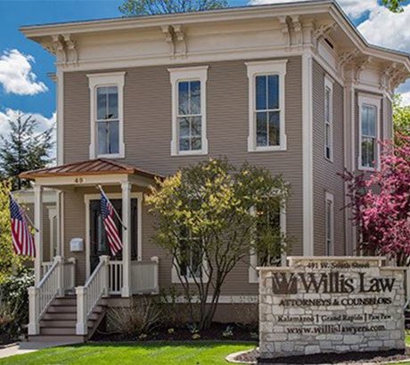Kalamazoo and Grand Rapids Property Tax Lawyers
Property Tax Appeal Attorneys
Taxes on Michigan properties can be significant. They fund public schools, local government, libraries, public transportation, community colleges and more. At Willis Law, we can help you reduce your real estate taxes and explain the process for doing so. These principles apply to your home, vacant land, rental property and business property.
If you are looking for legal advice with regard to property taxes and filing an appeal, please contact us today for a free initial consultation. We have office locations in Kalamazoo, Grand Rapids and Paw Paw.
Board of Review
The board of review is an administrative board that has the authority to weigh valuation and exemption evidence and, if necessary, change the assessor's assessment of individual properties. The board's review, however, is limited to reviewing the work of the assessor. The notice of assessment provides the dates and times the review board will meet, and the board provides a general notice to the public of its meetings usually by publishing in the local newspaper.
Some local taxing units require protests be addressed to the assessor as a prerequisite to a board of review protest. Assessor reviews occur in late January and February. As of October 2010, three taxing units require assessor's reviews: Detroit, Grand Rapids and Wyoming.
The General Property Tax Act (GPTA) permits a nonresident taxpayer to enter an appearance by written protest; a personal appearance is not required. Local government units may permit resident taxpayers to file written appearances as well. All local jurisdictions permit a written protest and do not require a personal appearance.
With regard to presenting evidence, the board's time may be limited. Presentations should be in a summary format with supporting documents. Because assessors will have access to and can influence the board's decisions, it may help to first present evidence to the assessor and obtain the assessor's evaluation. If there is no relief granted at this stage, then provide the board with information that responds to the assessor's concerns.
To appeal the classification of property, the GPTA requires that the property owner must notify the local assessor of the dispute and appear before the taxing jurisdiction's March board of review. The board may affirm or alter the classification.
The July or December board of review may correct qualified errors in an assessment for the year in which the error occurred and the subsequent tax year. Qualified errors are a clerical error, a mutual mistake of fact, or a qualified adjustment or exemption.
State Tax Commission
Since the creation of the State Tax Commission (STC), Michigan has constitutionally recognized the value of specialized administrative property tax adjudication. The STC has general supervision over the administration and assessment of property tax in Michigan. While independent from the Department of Treasury, the commission receives significant administrative support within the department. The three commission members are appointed for six-year terms. Not more than two of the commissioners may be of the same political party, and one of the three commissioners must be a Level IV Assessor.
Each fall, the STC publishes a bulletin outlining statutory tax dates for the following tax year. See the STC 2011 Property Tax and Collection Calendar.
Michigan Tax Tribunal
The creation of the Michigan Tax Tribunal (MTT) was established pursuant to Act 186 of 1973 Tax Tribunal Act. It consolidated most standard property tax valuation and exemption appeals in a single state forum, eliminating actions before county circuit courts and the STC. The MTT shares many features of the U.S. Tax Court and is created within the executive branch of the government. All seven members are appointed by the governor to a four-year term. By statute, most members are not attorneys. Three represent a professional perspective relevant to state tax and property tax matters and two must be attorneys with at least five years' state tax-related experience. Two simply require five years of experience.
The process of evaluating whether properties are over assessed begins in December immediately preceding the tax year. Appeal consideration is important for property that was acquired during the year, as the newly acquired property's taxable value will become the property's assessed value. December is also a good time to verify the name and address on the assessment roll, and to meet with the assessor before the assessor sets the new value for the upcoming tax year.
Exception
An appeal of an assessment dispute as to valuation or exemption must be filed before the statutory due date, and that date depends on the property's tax classification. In 2007, the legislature crafted an exception to the general requirement of a prior protest to the board of review to appeals of certain property classifications. The protest requirement to the board of review was made optional for property classified as industrial, commercial, and developmental real and personal property. Property owners of this classification have the option of protesting to the board of review or filing an appeal directly with the tax tribunal on or before May 31 of that year. For all other classifications, a prior protest to the board of review is still required.
Method of Filing an Appeal to the Tax Tribunal
Filing the appeal does not need to be made in person and is considered filed if:
- Postmarked by the U.S. Postal Service
- Delivered to a designated delivery service for filing at the tribunal
- Delivered in person
There is no requirement that property taxes be paid before filing an appeal. However, failure to pay property tax may delay receiving a final decision.
There are two tribunal divisions. Litigants in the Entire Tribunal Division bear the responsibility of complying with the form, filing and service requirements very similar to the Michigan Court Rules, including discovery and motions to the tribunal. By contrast, the Residential Property and Small Claims Division is an informal process intended to accommodate residential homeowners and individual taxpayers representing themselves. In Small Claims, there is no discovery except as the tribunal permits.
Documentation
Depending upon the property, local units typically prefer to review some of the following:
- Appraisals
- Sales of comparable properties
- Listings of the subject properties and comparable properties
- Purchase agreements
- Construction costs
- Repair bills and estimates
- If the property is income property, three years of operating statements, rent rolls, and a sample lease or rental agreement
- Prior appraisals
Assessors may also request financing appraisals. These are typically prepared for the lender or mortgagor, and such an appraisal evaluates investment value, not market value.
Property owners may also want to request the following through discovery or through a Freedom of Information Act request from the assessor:
- Property records cards
- Land value maps or grids
- Economic condition factor studies and maps
- Comparable sales, rents and other information from other taxing jurisdictions
- Sales studies
- The assessor's determination of market rent, market vacancy rate and the market capitalization rate
- Photographs or diagrams of the subject property
Formal discovery is not required in the Small Claims Division, but it is permitted.
Legal Standards
The legal standard in presenting and reviewing evidence is consistent with Michigan's constitutional standard for review. The tribunal's factual findings must be supported by competent and substantial evidence. The parties' burdens of proof are relevant. Petitioners have the burden of proof in establishing the true cash value. Tax collecting agencies have the burden of proof to establish a correct equalization factor and prove it was uniformly applied.
Defaults
Tax Tribunal Rule 247 permits the tribunal to place a party in default if the party has failed to plead, appear or proceed in accordance with those rules.
Settlement
The bulk of cases are resolved by settlement or dismissal, especially cases in the Entire Tribunal Division. The process includes filing a joint stipulation requesting a consent judgment be entered and if the tribunal approves the terms, a consent judgment is entered, which directs local units to correct the tax roll and refund taxes paid. Without this order, local units can do nothing.
Small Claims Appeals
Small Claims has jurisdiction over the following:
- Residential real property
- Agricultural real property
- Real property with less than four rental units
- Any property for which the amount of the contended state equalized value is not more than $100,000
- Special assessments for which the amount of the contested assessment is not more than $20,000
There are four filing requirements…
- A completed original petition and one copy
- Timely submission
- Required filing fee
- A copy of the Board of Review Form 618, if it is available
There are no fees for small claims valuation appeals involving property that has a principal residence exemption of at least 50 percent. For all other small claims appeals, the fee is:
- $125 for state equalized values of $100,000 or less
- $200 for state equalized values between $100,001 and $500,000
- $300 for state equalized values of more than $500,000
Entire Tribunal Division Appeals
The Entire Tribunal Division has jurisdiction over everything not covered by Small Claims; i.e. disputes over $100,000 in state equalized value. Most of these appeals involve commercial and industrial properties. For a full description, go to Michigan DELEG April 2011.
Nonlawyers are permitted at the tribunal appeal level, but it is not advised. The entire tribunal has an active discovery and motion practice, and appeals are generally not scheduled for hearing until a year or more after filing. While the tribunal relies in part on Michigan Court Rules, it has its own procedures that are typical of administrative hearings and includes:
- Pleadings – Petition and Answer
- Deadline for filing is May 31, and answers must be filed 28 days after service of the petition
- Counsel Conference
- Both parties must conference to discuss the dispute, discovery and settlement options
- Prehearing
- This is the first meeting with the tribunal member assigned to hear the case.
- Hearing and Post-hearing Briefs
- The hearing will be at the tribunal's office in Lansing
- Opinion and Judgment
The tribunal member will provide an opinion and judgment
Petition
The petition must contain name and residence, and if a corporation, principal office; name of opposing party; description of the controversy including type of tax and tax year; present use of the property; what the matter specifically involves (valuation, assessment, exemption, etc.); statement of amount in dispute; whether the amount has been protested in a timely manner; facts relied upon; the relief sought; and signatures.
Fee (as of November 2010) (see Small Claims filing fees above)
- $250 for state equalized values of $100,000 or less
- $400 for state equalized values between $100,001 and $500,000
- $600 for state equalized values of more than $500,000
Information about the various filing fees is available at www.michigan.gov.
Discovery
Following the counsel conference and prehearing conference, discovery typically occurs. The tribunal discovery rules acknowledge only three discovery tools: interrogatories, depositions and a request for production of documents or site visit.
Interrogatories are a series of questions that must be answered separately, in writing and under oath. Answers must be signed and served within 28 days after service.
Unless the parties stipulate to take depositions, the tribunal requires a motion be filed requesting depositions. Subpoenas can be issued by the tribunal either for depositions for trial and may request the attendance and testimony of a witness or for production of documents or other evidence.
Requests for production of documents generally follow Michigan Court Rules. The tribunal rule permits a party to seek from another party the production of documents or items or the opportunity to enter and inspect the property under appeal. Requests must list each item individually or by category and specify a reasonable time and place for the inspection.
Appraisals
The tribunal's administrative rules have generally made submission of a property appraisal a requirement, not an option. Litigants may not simply present evidence at a hearing. The rules provide that a "valuation disclosure" shall be filed and exchanged.
"Valuation disclosure" is defined as:
"Documentary evidence or other tangible evidence in a property tax appeal which a party relies upon in support of the party's contention as to the true cash value of the subject property…and which contains the party's value conclusions on data, valuation methodology, analysis or reasoning."
The valuation disclosure need only contain a statement of value and supporting documentation. More often than not, the valuation disclosure will be an appraisal. While another common valuation disclosure is submission of the assessor's property record card, in recent cases, the tribunal has declined to assume the burden of this review task. The recent trend in requiring appraisals is that they conform to the Uniform Standards of Professional Appraisal Practice.
The principal function and greatest value of an appraiser is to serve as an impartial third party who will provide an unbiased, individual assessment of the property. The professional has no interest in the property, financial or otherwise, that might affect the way the property is valued.
When selecting an appraiser, choose one who is state-licensed and has a professional designation from a professional organization. Verify that the appraiser agrees his or her work can be used at the hearing, and that the appraiser is willing to appear on your behalf as a witness to give testimony.
Other Hearing Considerations
The hearing must be officially recorded. The parties are required to supply a list of exhibits. Witnesses must be disclosed by exchanging a witness list. To secure the attendance of a witness, subpoenas must be served not less than three days before a scheduled hearing. Witnesses are entitled to the same fees as in Michigan's circuit courts.
Decisions and Orders
If the decision and opinion or the order is prepared by an administrative law judge, a proposed decision will be drafted and served. There are no tribunal rules regarding the treatment of proposed decisions by administrative law judges, and the APA thus is applicable. A party adversely affected by the proposed decision may file written exceptions. If written exceptions are filed, a tribunal member will review the proposed decision and prepare a final decision and opinion.
Rehearing and Appeals
Litigants have two options once the tribunal renders a decision and opinion or issues an order. They may file a motion for rehearing or they may appeal to the Michigan Court of Appeals.
If there is no further appeal of the tribunal's final opinion and decision, the local assessing unit is required to correct the tax rolls within 20 days of the order and a refund must be issued in accordance with that decision. If an appeal is taken, the relief is stayed until entry of the final order on appeal.
Historic Sales Information
Be aware that property tax valuations are based upon historic sales information, which is generally a two-year study. This data will not properly reflect current market trends. During periods of inflation in real estate values, the studies lag and the state equalized value and taxable values will be low. During downturns in the real estate market, equalized and taxable values may be higher than market prices. Make sure you know all of these values before going forward with your appeal.
For more information on property tax appeals, contact us online or call (888) 461-7744 today for a free initial consultation with our lawyers. We have office locations in Kalamazoo, Grand Rapids and Paw Paw.
Meet Your Legal Team
Helping You Achieve the Best Possible Outcome
-
 Michael Willis J.D., C.P.A. Director and Co-Founder
Michael Willis J.D., C.P.A. Director and Co-Founder -
 Shaun Willis J.D. Director and Co-Founder
Shaun Willis J.D. Director and Co-Founder -
 Frank Willis J.D. Chief Senior Counsel
Frank Willis J.D. Chief Senior Counsel -
 Donald Smith, J.D. Attorney/Partner
Donald Smith, J.D. Attorney/Partner -
 Mariko Willis, J.D. Of Counsel Attorney
Mariko Willis, J.D. Of Counsel Attorney -
 Samuel Gilbertson J.D. Managing Partner
Samuel Gilbertson J.D. Managing Partner -
 Davis Martin, J.D. Counsel
Davis Martin, J.D. Counsel -
 Paul Morgan, J.D. Senior Counsel Attorney
Paul Morgan, J.D. Senior Counsel Attorney -
 Chico Obande J.D. Attorney
Chico Obande J.D. Attorney -
 Jennifer Grahek, J.D. Attorney
Jennifer Grahek, J.D. Attorney -
 Aric Kasel, J.D. Attorney
Aric Kasel, J.D. Attorney -
 Cody Hayward, J.D. Attorney
Cody Hayward, J.D. Attorney -
 Austin Beaudet Attorney
Austin Beaudet Attorney -
 Adam Bancroft, J.D. Counsel
Adam Bancroft, J.D. Counsel -
 Verelle Kirkwood J.D. Of Counsel Attorney
Verelle Kirkwood J.D. Of Counsel Attorney -
 Kristyn Meulenberg J.D. Of Counsel Attorney
Kristyn Meulenberg J.D. Of Counsel Attorney -
 Nicholas Vogelzang Of Counsel Asbestos Litigation Attorney
Nicholas Vogelzang Of Counsel Asbestos Litigation Attorney -
 Wally Ferrara Operations Manager
Wally Ferrara Operations Manager -
 Robin Vleugel Receptionist
Robin Vleugel Receptionist -
 Michele Guyman Paralegal
Michele Guyman Paralegal -
C ZClare Zemlick Legal Assistant
-
 Brian Thompson Paralegal
Brian Thompson Paralegal -
 Angela Doster
Angela Doster -
 Patty Stickels Legal Assistant
Patty Stickels Legal Assistant -
 Kay Davidson Legal Assistant
Kay Davidson Legal Assistant -
 Karen Zimmerman Legal Assistant
Karen Zimmerman Legal Assistant -
 Robert Wilson Chief Financial Officer
Robert Wilson Chief Financial Officer -
 Mark Zigterman Accountant
Mark Zigterman Accountant -
 Margarita Jensen Intake Coordinator
Margarita Jensen Intake Coordinator -
 Patrick Willis Courier
Patrick Willis Courier







[2].1911210950550.jpg)



.2208291210550.jpg)























